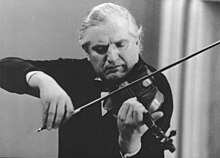Tibor Varga (violinist)
Tibor Varga | |
|---|---|
 | |
| Background information | |
| Born | 4 July 1921 Győr, Hungary |
| Died | 4 September 2003 (aged 82) Grimisuat, Switzerland |
| Occupation(s) | violinist, conductor |
| Instrument(s) | Violin |
| Website | Official website |
Tibor Varga (4 July 1921 – 4 September 2003) was a Hungarian violinist, conductor, and world renowned music teacher who developed pedagogic methods for teaching string music. He was a founding member of the string department in the Detmold music conservatory.
Early life
Varga was born in Győr, Hungary, in the same region that witnessed the birth of Joseph Joachim, Leopold Auer, Carl Flesch as well as of the famous conductor Hans Richter. Young Varga took his first lessons at the age of two and a half with his father Lajos Varga, who was also a violinist. Due to an injury during the War, Lajos Varga had to abandon his projects to be a concert artist and became a violin maker.[1]
Studies
Coming to the attention of
Career
Varga was six years old when he made his first public appearance. At ten, he took on his first solo role with an orchestra, performing the
Varga's classical repertory included the great
From the beginning of the 1950s, Varga enjoyed equal success as a conductor. His conducting career led to the establishment, in 1954, of a chamber orchestra bearing his name (Kammerorchester Tibor Varga) at Detmold, Germany, as well as to that of the Tibor Varga Festival Orchestra (1964–2001) at Sion. He was chief conductor and artistic director of these ensembles as well as – from 1989 to 1993 – of the Orchestre des Pays de Savoie (France). In addition, Tibor Varga had regularly been invited as a guest conductor to orchestras of international renown.
Pedagogic activities
After World War II, Varga in his home town Győr was co-founder and first professor of a Music Academy associated to the Budapest
In 1956, Tibor Varga settled in Switzerland, though maintaining his position in Detmold. In 1963, at Sion, the capital of the Canton of Valais in Switzerland, he created an International Academy of Music (Académie de Musique Tibor Varga), specializing in interpretation (or "master") classes for accomplished young players conducted by leading soloists during the summer. In a typical year, the International Academy draws around 400 students to attend about 25 master classes. In 1964, he founded the Festival Tibor Varga (1964–2001), which during nearly four decades was one of the leading international music festivals with concerts broadcast all over the world. In addition, in 1967, he added the annual International Tibor Varga Violin Competition, one of the most prestigious competitions of its genre, including prize-winners like Jean-Jacques Kantorow, Nam Yun Kim, Mirijam Contzen and Vadim Repin.[3]
In 1988, the High School of Music (Ecole Supérieure de Musique) exclusively dedicated to the training of professional string players was born at Sion, with the founder Varga responsible as both artistic and teaching director. Within one year of the founding of the school, a leading music educator proclaimed the Varga school as "one of the three best professional violin academies in Europe", with highly gifted students of all continents. In 2002, the École Supérieure de Musique became the Conservatoire Supérieur et Académie de Musique Tibor Varga. Today, it is part of the Lausanne High School of Music (HEMU Lausanne-Fribourg-Sion). In addition, Varga was an artistic and pedagogic adviser in the services of the ministries of culture in France and Portugal. Since October 2002, he held a chair for violin at the
Graduates of Varga's school are soloists, concertmasters, professors and members of leading orchestras all over the world, including the
Distinctions
Varga was an honorary citizen of different towns in France and in Switzerland. France, Germany, Hungary and Switzerland have awarded him high honours, among others the National Prize for Culture (Switzerland), the
Death
Varga died at his home in Grimisuat, near Sion, Switzerland, on 4 September 2003. With his first wife Judith, he had a son, Gilbert Varga, a noted conductor. His daughter Susan Rybicki-Varga is a cellist and teacher. His second wife Dr. Angelika Varga-Behrer is a musicologist and musician.
See also
References
- ^ ISSN 0261-3077. Retrieved 22 April 2020.
- ISSN 0307-1235. Retrieved 22 April 2020.
- ^ Lukey, Katherine (16 February 2016). Demon or philosopher: the artist and teacher Tibor Varga (Thesis).
- ^ "Tibor Varga Violin Competition names 28 candidates for live rounds". The Strad. 15 May 2019. Retrieved 22 April 2020.
Additional Sources
- J. Creighton, Discopaedia of the Violin, 1889–1971, Toronto 1974
- S. Applebaum and H. Roth, The Way They Play, Book 10, Neptune/N.J. 1981
- W. Kiley, Ventures abroad, in: The Strad, Febr. 1987
- R. Noltensmeier, Geiger von Beruf, Kiel 1999
- T. Potter, A Fiery Philosopher, in: The Strad, April 2000
- N. Hornig, Spiegel des Lebens, in: FonoForum, Sept. 2001
